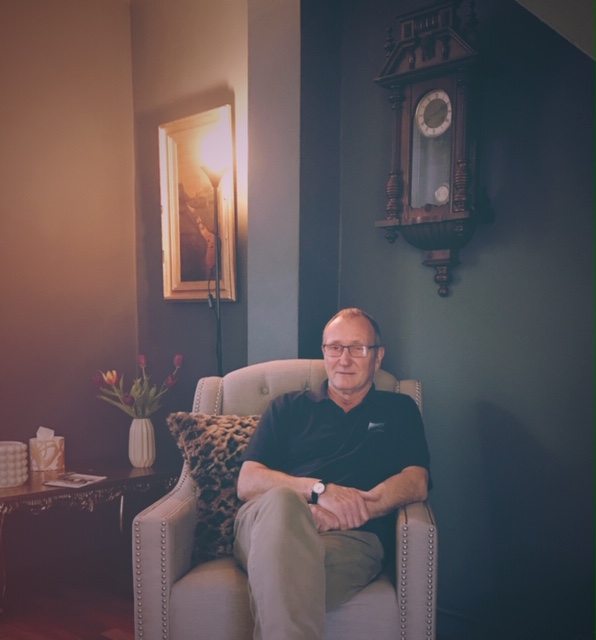
11 Feb Let’s hear it for the Boys Series – The Power
Growing up in a peaceful seaside town not too far from the hustle of Cardiff was heaven. Obviously as a child I never realised how lucky I was to live there but it was the best place to be raised. We had everything we could possibly need – Woolworths, the Beachfront, the amusements under the multi-storey car park, Alexandra Park and Tony’s pizza.
Penarth is different now it has become haughty and dull but when I was young, I couldn’t move without people stopping me. Shockingly, not because everyone wanted to talk to me, but my Dad was P.C. Malcolm Thomas, and EVERYONE knew him.
The local Bobbies were a completely normal sight of our town. My Dad was a Community Constable and he would always be on the beat and built a rapport within our town’s community.
“I liked being amongst the people on a genuine basis as opposed to just being out there to arrest people and lock people up, I wanted to get along side people and see what made them tick. It wasn’t unusual for me to sit on a bench with a guy I had previously arrested and share some chips and a can of coke with him. What was between us was I was doing my job being a Police Officer and he thought he was doing his job because he thought he could break into places and steal stuff and sell it on the cheap to make money for himself, that was his job. It didn’t make him a bad human being. What he was doing was wrong, but he was a human and he still had some good attributes to him, and I think it paid off because even today people I arrested thirty years ago still stop me in the street and say Hello.”
This is what separated Malcolm from the other officers. His genuine kindness and concern for the people that were making wrong choices. He had time for everyone and anyone and just wanted to help. Malcolm took pride in merging the community and the police force creating events for the people of Penarth. He held a sports activity day event that all the schools competed in called “We are the Champions” that ran for 17 years. He organised swim marathons and jet ski races down the beach. He got the fire and ambulance services involved with the projects too to show the community that the people in the uniforms do care and that the reason they had the jobs was to protect them.
“I once got a call at the station from a guy that had been a serial offender that I had arrested on many occasions. He had gotten on a straighter path and had a severely disabled daughter and she was on her death bed. He called because he wanted me to go around and hold his daughter at the same time and we sat on the bed and the daughter died in our arms and that was an honour. As sad as it was, that somebody would phone, someone that I had arrested and put in prison on multiple occasions, he wanted me to be there.”
This is what set him apart. His never-ending compassion.
There was another part of Malcolm that I believe sourced his empathic nature and that was that he was a Christian and heavily involved with the church. He attended bible college after devoting himself to God and got the qualification to become a Lay minister. Along with his wife he oversaw the young people in the church and the house was always full of happy laughter from our extended family. Weekends off from the police force were filled with trips away with the church family where we would walk, sing, cook have talent shows all the good, wholesome fun. There was a good core group of people and one day a dark cloud ascended on the beaming community.
John, one of the most beloved members of the youth group took his own life.
“It had a massive effect. It was such a huge effect on his mates, but it also influenced people’s relationships with the ministers within the church. They felt that they had let him down. When John had returned from living in Guernsey, I would meet him on regular occasions to try and help him through it and combat the demons that were going on his life.”
It was hard to comprehend that someone within our happy, loving community could feel that sad and we had no idea.
“Despite the company he became lonely and sadly his inner loneliness got so bad that he couldn’t bring himself back out of it.”
Through the support of each other and from the support in their faith in God they got through those times. It was never quite same. The family had been pained through John’s pain and everyone became a little bit broken.
A few years later Malcolm would need the strength he found within God more than ever.
On June 3rd, 2001 he was playing boules – another one of his many hobbies – when giving a speech on the green his Sergeant turned up to break the news that his daughter had died.
At the worst moment of his life being in the force helped. The protocol and the mechanics of a death was all too familiar to Malcolm and being able to switch into police mode to carry him through the first horrendous days was a blessing in disguise.
“I put my policeman’s head on and dealt with everything their matter-of-factly. I wondered whether she had taken something or if she had had an argument with her boyfriend and he had killed her because you are naturally suspicious but knowing that he had tried to revive her those thoughts go and unfortunately it was just one of those things of an unknown heart defect. It was like an out of body experience. I was dealing with this as a policeman but by here I am her father. I remember being really miffed off with the police force, none of them came to speak to us. They spoke to her boyfriend – they had to in case there was foul play, but they didn’t come to us. I was so annoyed I went to the station to get the key to her flat and I tore into him. I said “I’m in the police force, you’re a sergeant, my daughter had died and not one of you came and spoke to me or the wife. I am appalled that I’m in the same job and you didn’t have the courtesy to speak to us””
The police force hardens you. It has to. It is your job to be faced with some of the worst scenarios a human can face, and death is intimate and personal. Having to turn up at a stranger’s door to break the news that a person they love has passed away in an undignified way because that’s when the police get involved you must be sympathetic but focused. Emotion cannot come into play at that moment in time. The problem with that is – just as the offenders are human – officers are human, and the hurt must come out at some point.
“You have got be hard, but it never goes away. It never leaves you.” Supressing his emotions from such a gut-wrenching episode, it sank him into a grief-ridden depression, and he had a breakdown. The police have a retreat that they sent Malcolm to help come to terms with losing his daughter and his painful divorce that he was going through at the same time. He is lucky to have had that rehabilitation centre, without that he may not have taken the next path in his life.
Every hardship brings lessons and growth and from Natalie’s death Malcolm wanted to help on a deeper level and took a course on psychological debriefing for people who are united in trauma.
“I would get everyone who had been involved with a major incident to meet in a room so everyone from the person who took the very first call to the officers on the scene and we would talk about how they felt, how they dealt with the situation etc. We go through trauma and you would always have senior officers saying “This is why you joined the job, deal with it” then you had others saying “We realise you go through a lot and you bottle it up and maybe we need to look at giving you an aid to voice your fears and worries and guilt trips” I was able to use my personal trauma and grow from it and to help others.”
I asked him how his faith changed in that time. How does one keep faith when after living the good Christian life they are repaid with this? How could God do that?
“Its easy to blame God. It’s even an expression that non-religious folk use. “God on Earth, Why has this happened? God’s sake, Why this? God, help me!” They have never prayed in their life, never had an ounce of faith in their life but when things go wrong it is God’s fault. It is the simplest thing to do even though they don’t even believe in him. He gets the blame for everything but none of the praise. For instance, when a child is born someone who doesn’t believe in him won’t thank him for that miracle – because it is a miracle – but a child dying, that’s Gods fault. I have questioned my faith, but I never lose it.”
It is hard to describe God, especially to non-believers. Even more so when we have had some of the most prolific scientists grace our TV to explain every phenomenon we have. They cannot – however – dispute faith. Faith is a personal choice and a personal preference. One person’s faith is different to everyone else’s and there is no right or wrong answer to what or who you choose to put your faith in.
“If you get a magnet and you put it next to metal, you’ll see that metal move, but you can’t see the power in the middle and that is what God is to me. You can’t see him, but you can see the power in the middle. So many people get fixated on putting a face to God but it’s not a guy in a white cloak with long hair and a beard sitting on a cloud – That’s rubbish. It’s a power.”
Within that sentence it makes so much sense to why the police force called him into its service. To have the power to help and to have people have faith in him to guide them down the right path.
Even if you don’t believe in God you can’t belittle a man who has spent his entire life just wanting to leave the world a better place.

No Comments